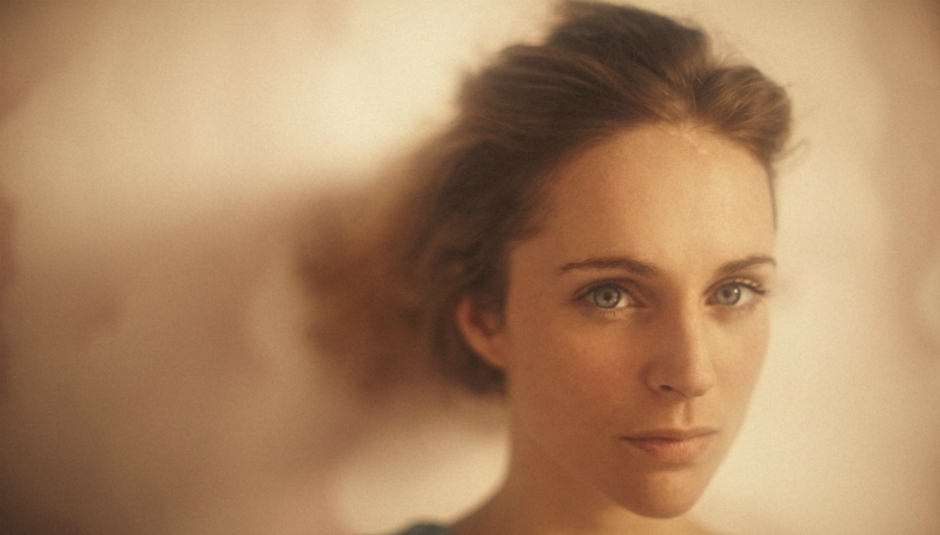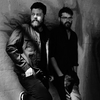It’s the end of a long week for Agnes Obel when I speak to her on a flying visit to the UK. Fresh from a performance on BBC 6 Music with Marc Riley, Obel is busy with final preparations for the release of her new album, Citizen of Glass.
“I feel completely wrecked right now!” the enthusiastic but clearly exhausted Dane tells me. “All this travelling is tiring but I also get a little bit anxious before a release so I can’t really sleep. I feel so sleep deprived right now but the ground under me, as we say in Danish, is really happy, but the person spinning is really tired!”
Looking forward to a two-day break in her adopted Berlin – a place she has lived and worked for ten years – it’s surprising, after two platinum-selling albums across Europe, that Obel is so nervous about her album’s forthcoming release. “It’s really overwhelming to release to such a big audience and obviously I have no control over how it’s perceived. It can be really terrifying. It’s like jumping off a cliff.”
The nervousness may come from the fact that Citizen of Glass is a startling departure from her first two albums, 2010’s Philharmonics and 2013’s Aventine. Unlike those, Citizen of Glass is a concept album, with songs strongly woven together by an idea Obel read about in Der Spiegel whilst on tour two years ago.
“The term gläserner bürger came from German social sciences when they talk about privacy and surveillance, and how much privacy an individual has,” Obel tells me. “When they lose that, they say the individual is made of glass, the glass citizen. It’s also used in relation to the medical world, the glass patient. I just thought it was a really beautiful idea and it spoke to me.”
For Obel, the idea became symbolic of living in a time of increased self-reflection and self-scrutiny with Citizen of Glass being a platform to explore how we obsess over the presentation of our own lives as well as others, together with the ultimate suffocation, jealousy and inadequacy such observations bring.
“This feeling from the inside of being transparent, having your own eyes on you but from afar, of being made of glass, was fascinating to me. I realised that whether looking at yourself or feeling other people’s eyes on you, it’s the look of our time. It’s not just artists anymore who are using themselves as material in their work to look at their own lives as an artefact. We are viewing ourselves daily through this prism of self-reflection. It’s fascinating to me the way we communicate now in order to understand ourselves through things like social media.”
For such a successful artist, the public gaze is not something Obel seems wholly comfortable with; much of Citizen of Glass explores the fragility that comes with putting yourself in the glare of others. “I have a great need to perform my music, yet on the other hand I am super terrified. I want it to be as much from me as possible so I’m certainly part of this idea of wanting to document yourself, to put yourself out there. But then this whole thing for me is just an exercise of trying not to show it and I’m not very good at that. But then seconds after I perform live, I love it, and so then of course I am reminded of why I am doing it.”
Citizen of Glass is a melancholic, brooding affair with Obel’s ethereal voice magnified against haunting piano and cellos to create tense, gothic-like investigations of the self. Cinematic strings are layered on top of piano together with a range of new instruments that Obel searched far and wide for, including a vintage celesta she had shipped across from America, a spinet, a rote, and a rare instrument called a Trautonium (a 1920’s synth, to you and me) Obel had specially made and shipped to her Berlin home. With multi-track layering (Obel has layered 250 tracks on top of one other) alongside harpsichord recordings she purchased from the Instrument Museum in Germany, finding Obel amidst the layers seems deliberately difficult on tracks where she sings vocals, but less so on her strong instrumentals ‘Red Virgin Soil’ and ‘Grasshopper’, where the glass-like music seems to somehow, paradoxically, reveal more.
“In my music, I don’t always know where to draw the line – whether I should keep something secret or when I should or shouldn’t use something in my music. I think it’s really important to use yourself, but I also think it’s important to have something that’s secret and your own. I think for me it’s always easier to do instrumentals because I don’t have to sing and I’m super perfectionistic with my singing. As soon as I make a song with lyrics, it takes longer because I put so much energy into it. I find it interesting that I don’t know the meaning of the songs I make at first. I realise what they are about much later on. I don’t know everything about myself and sometimes it’s in the music even if I want it to be or not. It’s the same with secrets. Even if I don’t want to show everything, it might still be there anyway. I’m not sure you can really control it if I’m being really honest.”
It’s clear when talking to Obel that Citizen of Glass has taken Obel out of her comfort zone instrumentally. “Normally, I’m very conservative with my overture but this album has been a completely different experience. I use the same instruments again and again – I will use the same microphone, even the same chair, because it’s very hard for me to change. I become very attached to the stuff I use because I am very superstitious – it’s ridiculous!”
In order to achieve her conceptual vision with Citizen of Glass, however, Obel knew she needed a different approach. “I knew that I had to do other things with this album because the glass theme in my mind had to resonate in a glass-like way – it had to have a different sort of temper and nervous system. It needed something less obviously beautiful and less calm because this sensation of being watched by others isn’t necessarily a very calm experience. And to get into that state of mind, even to be able to write the songs, I needed instruments with more tension, with more quirk and a more metallic sound almost. I started researching and as soon as I found the title for the album and the glass theme, I looked for new instruments to enable me to create a glass-like sound.”
Whilst experimenting with strange instruments is something new to Obel album wise, it’s not something she is unfamiliar with. Her father was a talented jazz musician who collected and played an array of unusual instruments during her childhood. Whilst on tour with Aventine in 2014, the same year she discovered the concept of the glass citizen, Obel’s father died and whilst the fragility on Citizen of Glass is predominantly about her exploration of the self throughout, it also feels somehow related to grief amid deep sadness, perhaps most notable on the album’s title track. It feels as though it is also exploring loss, whether consciously or not, with marks of her father’s memory reoccurring, very quietly, across the album, be it in the jazz-like strings on the playful ‘Red Virgin Soil’, the brave experimentation reflecting her father’s musical inquisitiveness or in her emotive lyrics which seem as much about loss as they are about exploring self-reflectivity. “Rend a black drop from my heart / With the weight of days / The end of time has just begun / I hear it call your name,” Obel sings on ‘Citizen of Glass.’
“I’m quite protective of my music,” she tells me. “Actually very often when I play something for somebody, I regret it right after. Again, it’s the secret, it’s a powerful thing to have a secret when you make your song – it’s your idea. You have to make space for the idea to grow and become something of its own before you get all these impressions of what other people think. I think to look at things with the eyes of others is not very good for creativity and not good for making things grow naturally. And especially for me, I’m not very good at showing it off.”
Recording and producing in a tiny Berlin apartment presents challenges for Obel, not least because her boyfriend can’t help but hear as there is nowhere else for him to go, but it also brings her a privacy from the wider world that you sense she relishes. “There are also some stages I make sure my boyfriend doesn’t hear because I just can’t handle it. Even if he thinks it sounds great, sometimes that also confuses me…so I keep it a secret! I love editing at home. It sounds horrible but it’s really cool. It’s like crocheting or something – you build up this whole pattern of sound. It is a very weird way of recording at home but it is my own, it’s my own little editing project. Sometimes, something really cool can suddenly happen and you hear this hidden gem somewhere amongst a pile of recordings.”
I wonder how Obel’s need for privacy chimes with her role as a live performer, and I wonder if live shows may present more challenges to her personally. Her response, however, reveals the opposite, with Obel being a fan of on-stage transparency, wanting to connect openly and honestly with her audience. “When a performer or a band are wearing costumes, or if they are so stylized that they are someone else, it’s definitely a way of protecting yourself. I love this kind of performance art but I personally feel really moved where I have a feeling that I know the person after seeing the show – I want to see them and it can make the connection between the audience and the performer amazing and I know I definitely want to do that.”
For Obel, the way to achieve this is by not rigidly planning the live moment. “When I released my first album, I had not prepared myself for performing. I had not really thought it through about how I wanted my live shows to be. I just sort of did it and didn’t really think about it. Now, six years on, I’ve played a lot of shows and I’ve had a lot of time to reflect. Now I really know what kind of show I like. I like it best when things are not planned. I want some space for accidents and when you perform like this, you are naked. You can’t hide anything in that performance situation – it’s transparency that’s intriguing and fun. You see the music coming from a human being in a much more direct way and I think that’s really interesting. I am going to try to not be afraid of it.”
Literary and gothic cinematic influences seem to have followed Obel throughout her career and whilst Citizen of Glass is more abstract than previous works, Obel’s research of the glass citizen brought her into some familiar literary territory. “I’ve always used books to write. I had to really read and research the glass theme well. This idea of documenting yourself from afar was different and unusual and I wasn’t really sure I was right. I read a piece in The New Yorker about a book from the 1920’s called Envy by Yuri Olesha. One of the characters in the book is really transparent and completely unreal and ridiculous. The protagonist is really hating his roommate because he is this representation of the ideal citizen. The author uses characters to portray different forms of society and citizens – the main protagonist is the old system and the roomante is the new one. The thing that related to me was this idea that an ideal person is an illusion; nobody can be completely transparent because we are these complex beings with minds and mystery. It’s such an absurd idea or fantasy to have, that we have no hidden emotions, that everything is on show, but many think this is the case now and that revealed itself on the album.”
The book inspired ‘Golden Green’, a song looking at the different realities we create for ourselves when under the influence of social media observation. A line in the novel Envy wonders “now they tell me that no one cares about anyone’s individuality, the most remarkable individual is nothing…I lived and I did what they wanted to do.” But Obel’s message seems to be more forceful. “I wanna be just free…Who are you to take over my mind / With your eyes on me?” The album seems strongest when it wants to smash the idea of the glass citizen and it’s certainly at its most freeing on tracks such as ‘It’s Happening Again’ and ‘Trojan Horse’ with both seeming to find catharsis in abandoning subjectivity, Nick Cave like. “I took a day or two / To exile from the light / To unfold that prisoner / They call a mind.”
“I love music that triggers images in my mind,” Obel tells me as we near the end of our interview. “I love how music can take you on a journey and you’re suddenly somewhere else even though you’re in your little boring room somewhere. Certain notes and sounds in a situation can make that situation wonderful. When I make music, I try to do that and with language that I am trying to develop on my own. I do think about genre and different styles of music and instruments more than I think about having certain musicians or composers that I want to sound like.”
Sometimes, in fleeting moments, we can observe Obel and her feelings on subjectivity overtly, amidst those notes and sounds she has worked so hard to put together, but more often than not she is hidden beneath many concealing layers of music and meaning – just like the image on the album’s cover. Whether she is figuring out what subjectivity means via a duet with herself on ‘Familiar’ (she distorts her own vocals to make a robotic sounding doppelganger), examining the jealousy it causes on ‘Golden Green’ or showing you how we’ve become too transparent, maybe even too personal on songs such as ‘Mary’, Obel is always in a constant, artistic dialogue with herself and her audience – something which makes Citizen of Glass such an artistically fascinating comment on the observation of our times.
Citizen Of Glass is out now on PIAS America. For more information, please visit her official website.






















